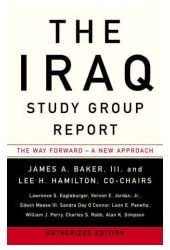The Iraq Study Group Report


For you news junkies, policy nerds, political bloggers and people wondering what the Iraq Study Group’s recommendations for how to fix the Mess O’ Potamia are, the Iraq Study Group Report is now available. 142 pages, 79 recommendations, the difference between Sunnis and Shi’ites explained (and some people in Washington need to study up on that), and one president who’s likely to ignore it if it differs from the “things are going well” tack.
An excerpt:
Current U.S. policy is not working, as the level of violence in
Iraq is rising and the government is not advancing national reconciliation. Making no changes in policy would simply delay
the day of reckoning at a high cost. Nearly 100 Americans are
dying every month. The United States is spending $2 billion a
week. Our ability to respond to other international crises is
constrained. A majority of the American people are soured on
the war. This level of expense is not sustainable over an extended period, especially when progress is not being made.
The longer the United States remains in Iraq without progress,
the more resentment will grow among Iraqis who believe they
are subjects of a repressive American occupation. As one U.S.
official said to us, “Our leaving would make it worse….The
current approach without modification will not make it better.”
Here’s how you can get your paws on it:
- Download it from me for free [1.7 MB PDF file]
- Download it from the unintentionally Orwellian-sounding United States Institute of Peace for free
- Buy it at Amazon.com for the low, low price of US$6.57.
Another excerpt:
The United States has made a massive commitment to the future of Iraq in both blood and treasure. As of December 2006,
nearly 2,900 Americans have lost their lives serving in Iraq. Another 21,000 Americans have been wounded, many severely.
To date, the United States has spent roughly $400 billion
on the Iraq War, and costs are running about $8 billion per
month. In addition, the United States must expect significant
“tail costs” to come. Caring for veterans and replacing lost
equipment will run into the hundreds of billions of dollars. Estimates run as high as $2 trillion for the final cost of the U.S. in-
volvement in Iraq.
Despite a massive effort, stability in Iraq remains elusive
and the situation is deteriorating. The Iraqi government cannot
now govern, sustain, and defend itself without the support of
the United States. Iraqis have not been convinced that they
must take responsibility for their own future. Iraq’s neighbors
and much of the international community have not been persuaded to play an active and constructive role in supporting
Iraq. The ability of the United States to shape outcomes is diminishing. Time is running out.
Recent Posts
A reminder for April Fools’ Day
Have a good April Fools’ Day tomorrow, but be mindful about your pranking.
How NOT to sell a computer
As I’ve written before, I sometimes browse Facebook Marketplace for nothing more than pure entertainment,…
Happy 10th anniversary, Anitra!
Ten years ago today, this happened: And since that day, it’s been an adventure. Thank…
Last Sunday’s accordion gig in Bonita Springs
It’s been over a year since I’ve played with Tom Hood’s band, the Tropical Sons.…
My plans for Burns Night 2025
Here’s the main course for dinner tonight... ...and that’s because it’s January 25th today, making…
View Comments
There are good points in your article. I would like to supplement them with some information:
I am a 2 tour Vietnam Veteran who recently retired after 36 years of working in the Defense Industrial Complex on many of the weapons systems being used by our forces as we speak.
If you are interested in a view of the inside of the Pentagon procurement process from Vietnam to Iraq please check the posting at my blog entitled, “Odyssey of Armements”
http://www.rosecoveredglasses.blogspot.com
The Pentagon is a giant,incredibly complex establishment,budgeted in excess of $500B per year. The Rumsfelds, the Adminisitrations and the Congressmen come and go but the real machinery of policy and procurement keeps grinding away, presenting the politicos who arrive with detail and alternatives slanted to perpetuate itself.
How can any newcomer, be he a President, a Congressman or even the Sec. Def. to be - Mr. Gates- understand such complexity, particulary if heretofore he has not had the clearance to get the full details?
Answer- he can’t. Therefor he accepts the alternatives provided by the career establishment that never goes away and he hopes he makes the right choices. Or he is influenced by a lobbyist or two representing companies in his district or special interest groups.
From a practical standpoint, policy and war decisions are made far below the levels of the talking heads who take the heat or the credit for the results.
This situation is unfortunate but it is ablsolute fact. Take it from one who has been to war and worked in the establishment.
This giant policy making and war machine will eventually come apart and have to be put back together to operate smaller, leaner and on less fuel. But that won’t happen unitil it hits a brick wall at high speed.
We will then have to run a Volkswagon instead of a Caddy and get along somehow. We better start practicing now and get off our high horse. Our golden aura in the world is beginning to dull from arrogance.